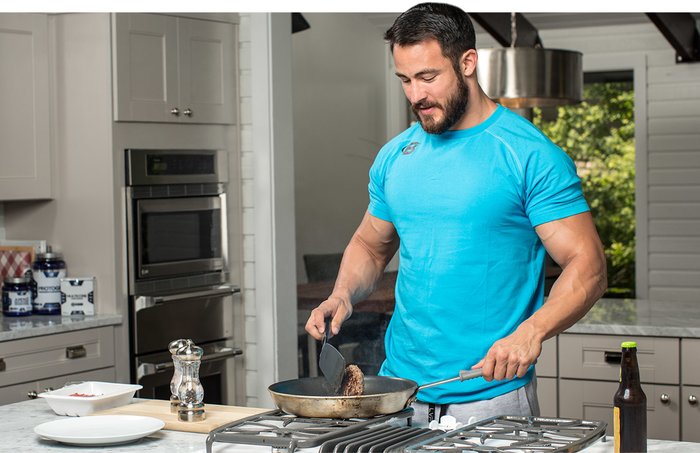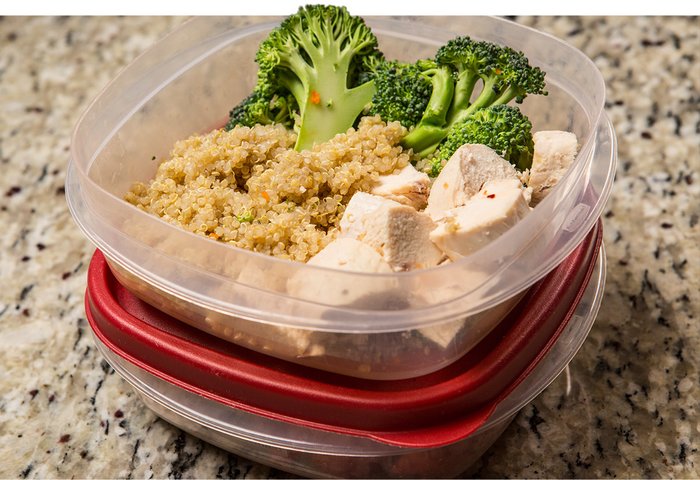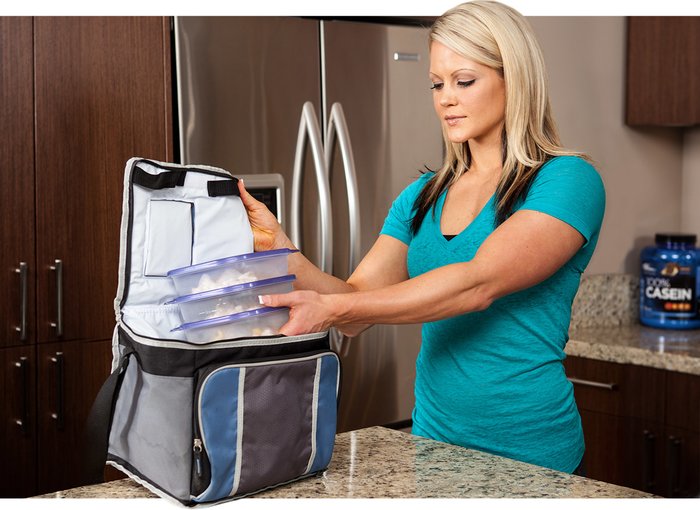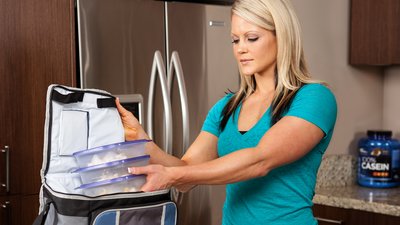Meal prep doesn't have to be something you dread. Rather than making last minute grocery trips and guessing about the numbers, follow these 5 simple rules of successful meal prep!
For many people, meal prep has proven to be the key to reaching their fitness goals. When someone finally gets the hang of it, their results almost invariably go through the roof. Afterward, they'll often talk about it like it's the simplest thing in the world. "Yeah, bro, take a few hours on Sunday and cook everything for the week."
Unfortunately, the whole process can prove overwhelming to the inexperienced, and even quite a hassle for veterans. Not only can a week's worth of meal prep eat up an entire afternoon, but if done wrong, it can turn you off from the idea completely, leaving you scavenging for fast food on the reg.
Successful meal prepping revolves around having a plan. This is crucial. Try winging it on the fly and you'll likely end up with mismanaged macros, forgotten veggies, or, worse, foodborne illness. Before you even set foot in the kitchen, commit these five meal-prep rules to memory!
1. Pick Your Day Ahead Of Time
Meal-Prep Sunday is a holiday widely observed in the fitness community. It may even be more popular than International Chest Day, aka Monday. Why? Prepping on the Sabbath doesn't interfere with your Friday and Saturday plans, and it's close enough to the start of the week to (hopefully) prevent having funky-smelling food by Thursday.

Meal-prep Sunday is a holiday widely observed in the fitness community. It may even be more popular than international chest day, aka Monday.
However, depending on how many meals you're making, doing all the prep on a single day can add up to quite a bit of food and time. Plus, depending on your protein of choice and preferred cooking method, you may still end up as that guy or gal in the office known for their stinky lunches.
News flash: Meal prep is only going to last if it feels manageable to you. If Sunday doesn't work, split meal prep into two days. This will cut down on the session length and definitely preserve the quality of your food. Sunday and Wednesday are usually a good pair, but find any two days that work best for you.
2. Know Your Numbers
Don't even think about meal prepping until you know exactly how much you're shooting for in terms of number of meals and what those meals are made of.
Meals: Determine the number of meals and number of days you will be preparing at one time. Some people find that preparing only their lunch for each day of the week is sufficient, because they're able to eat breakfast and dinner at home. Others have more success packing multiple daily meals for the entire week—or even all of their meals. Regardless of where you fall on the meal-prepping spectrum, choose a spot that sets you up for success and plan accordingly.

Macros: If you're cycling carbs and you need 350 grams of carbs one day, but only 200 grams the next, know this ahead of time. Outline your daily macros or needs, with specific meal-by-meal guidelines, and post it somewhere in your kitchen. Where better than the refrigerator?
To be clear, you don't have to count macros to make this work. But in either case, having concrete guidelines ahead of time will ease the shopping and prep to come. You can even take it to the next level and label containers by day and meal.
3. Stick With Staple Items
I am a huge advocate for including variety within your meals during the week. However, with that being said, spending time crafting gourmet concoctions such as creme brulee French toast or bacon-wrapped scallops in bulk may keep you in the kitchen for much longer than you anticipated. Plus, as a rule, the fancier something is, the worse it tastes when it has been sitting around for a few days in food containers.

Save the decadence for a fresh meal. When you're prepping, focus on choosing easy-to-cook, bulk-packaged foods that store well.
Save the decadence for a fresh meal. When you're prepping, focus on choosing easy-to-cook, bulk-packaged foods that store well. My recommendation is to mix and match from these categories and go to town:
- Protein: Chicken breast, lean ground beef, pork tenderloin, flank steak, lean lunch meat (turkey breast, ham, or roast beef) and low-fat beef jerky
- Carbohydrates: Oats, quinoa, couscous, brown rice, wild rice, whole-grain tortillas and bread
- Healthy fats: Almonds, walnuts, pecans, pistachios, pumpkin seeds, peanut butter, almond butter, olive oil and coconut oil
I'm not a fish guy when it comes to prepped meals, but feel free to experiment. Just make sure you use a well-sealed container!
4. Go Grocery Shopping
Grocery shopping might seem obvious, but beginning your meal prep with the remnants hanging out in your fridge and pantry is never a good idea. Sure, you might get a meal or two that way, but in the end, you'll either run out of food or become forced to use your protein-powder stash as reinforcements—for nearly every meal. That gets expensive fast.
Once you know your numbers, make sure you have everything to meet them. If you're one of those lucky people with a chest freezer, you may be able to plan weeks ahead of time. If not, make a weekly or biweekly trip part of your prep routine. Not only will it help you efficiently navigate the store, but it will also help you save money and avoid food waste.
5. Invest In A Cooler Or Insulated Meal Bag
The look of a fridge after it has been stocked with your meals for the week is incredibly rewarding. Instagram agrees. Towers of Tupperware, perfectly aligned with the perfect blend of macros—man, it's a sight to see! But when you bounce out of bed come Monday morning, you can expect to have a difficult time carrying your gym bag, briefcase, and numerous containers to work. Plenty of undeserving meals have ended up on the ground this way.

If you're prepping just one meal a day, you may be able to swing it. If you're the two- or three-a-day type, a cooler, insulated meal bag, or backpack of some kind is essential.
If you're prepping just one meal a day, you may be able to swing it. If you're the two- or three-a-day type, a cooler, insulated meal bag, or backpack of some kind is essential. Their controlled temperature can also help protect you from foodborne illness.
This extra purchase may sound like a luxury, but it has the potential to save you tons of daily frustration. If you're going to be doing this consistently—which is the only way to do it—then cutting out unnecessary hassles is essential! Make it easy, make it yours, and make it last.

